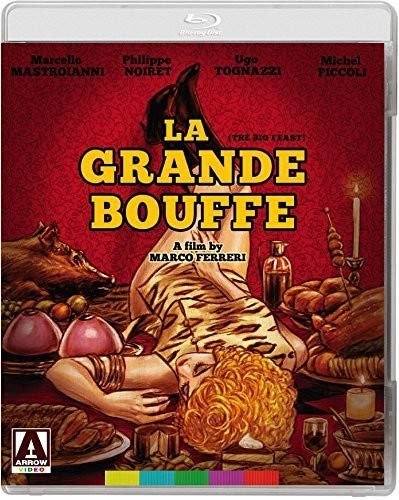
They say Catherine Deneuve refused to speak to her then-lover Marcello Mastroianni for a week after seeing his performance in La Grande Bouffe. It created a huge stir at the Cannes Film Festival. It was rated X in America, banned outright in Italy, and became part of a censorship legal battle in Britain.
It is surprising, then, just how tame the film seems from a modern angle. You’ll see more nudity and sex on a typical episode of Game of Thrones, more abandoned gluttony on any number of reality-television programs, and more scatological humor on any given night of Comedy Central. What modern viewers will find most shocking today is that the leading lady (Andréa Ferréol) is both fat and sensual. And by “fat,” I don’t mean Hollywood fat where she has only slightly more shape than a mop handle, but truly, honest-to-God fat. Yet the film never treats her like a punchline. Her ample amount of nudity is never mocked or laughed at, and she is admired and lusted after by all of the four male leads.
Our four men strangely carry the same first name as the actors that play them. There is Uzo (Tognazzi), a famous chef who can no longer satisfy his own appetites; Michel (Piccolli), a TV host who has pushed the medium as far as it can go; Marcello (Mastroianni), an oversexed pilot whose lust is never satisfied; and Phillippe (Noiret), a judge with an overbearing nanny (who still lives with and takes care of him though he is of considerable age).
Tired of life, the four retire to a Paris mansion to gorge themselves on every possible delicacy until they quite literally burst. Uzo has the best of everything delivered to their new home and cooks a never-ending pile of sumptuous foods.
Marcello quickly declares that he cannot eat himself to death unless he simultaneously satisfies his more feral lusts as well so three prostitutes are ordered. But not even these paid sex workers can stomach what is going on and soon enough they all leave. They often find themselves begging to be taken to the bedroom for some sex instead of having to eat more and more food. After realizing the men plan to kill themselves the girls are disgusted and show themselves out.
A local teacher (Ferréol) takes her students to see a tree in the house’s garden under which the famed French poet Boileau used to sit. The men invite her to dinner and she winds up staying for the duration. Unlike the call-girls, Andréa seems fascinated by the plan and happily takes part. She winds up being some sort of licentious angel of gluttonous mercy – happily feeding them, bedding them, and comforting them as they shed their corpulent mortal coils.
As with any controversial film, La Grande Bouffe has its admirers declaring the film has many depths past its artificial surface. It is a critique of bourgeois French society, they say, or a satire about the crassness of the rich who have everything imaginable except what might satisfy their souls. Then there are the detractors who complain its nothing but decadent trash – controversial for the sake of controversy.
Honestly, I’m not sure where I fall. I can definitively say that at just over two hours it is far too long. I don’t know enough about French life in the 1970s to understand any of its satire, if in fact it is satire at all. If it is supposed to make me understand how shallow the rich and famous are, I could have gotten that in far less time than I had to endure this film.
It is well made, well acted, and does contain a number of outrageously humorous and humorously outrageous scenes, but ultimately, it is only because of my critical duties that I made it through the entire thing. For those fascinated by films that stirred controversy, or the history of Italian and/or French film, or for those who like to mix their sex with their meals, then La Grande Bouffe might be of interest to you. For everyone else, might I recommend the infinitely more scrumptuous Big Night and perhaps a Victoria’s Secret catalog.
Once again Arrow Video proves they are second only to Criterion in creating masterful productions of interesting, somewhat obscure films. They have cleaned the audio and video up tremendously. There were no signs of scratches or blemishes. The film is very dark and hidden in shadows so the colors don’t exactly pop but they are clean and crisp. There is noticeable grain throughout the film, but according to the film’s notes, this was present in the original negatives.
The set comes with the film on Blu-ray and DVD. Extras include a French television profile of director Marco Ferreri from 1975, extracts from another TV series including interviews with cast and crew, a news report from the Cannes Film Festival, behind-the-scenes footage, a visual essay, news reports, and audio commentary on a few scenes.
At a time when many are declaring physical media dead, it is wonderful to still have companies like Arrow bringing us foreign, obscure, and controversial films cleaned up, presented in high definition, and with enough extras to give film scholars and fans a deeper understanding of where these films sit in the history of cinema. While I can’t say I’ll likely return to La Grande Bouffe anytime soon, I’m thrilled that I was able to view the film in such a magnificent way.